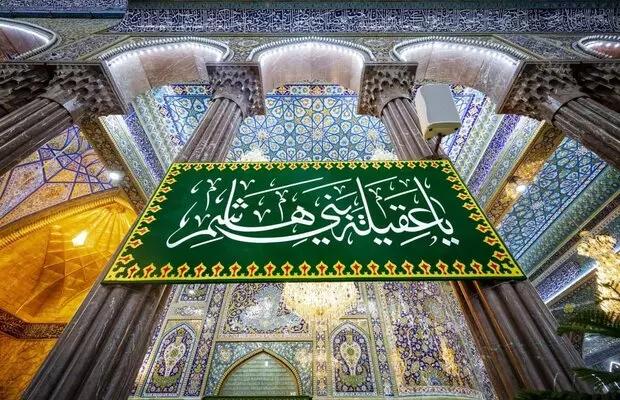From Karbala to Kufa
Omar ibn Saad left Karbala on the 11th of Muharram after having performed the funeral ceremonies and burial of the hell-ward bound dead of his army. The headless bodies of Hussein (a.s.) and his companions lay unattended and neglected in the desert for three days, When Ibn Ziyad's men left Karbala and nobody had stayed, some people of the tribe of Bani Asad came and buried the bodies of Hussein (a.s.) and his companions.
When Ali ibn Hussein (a.s.), who was twenty-two at the time, and Zeinab were being taken to Kufa as prisoners on the 11th of Muharram, the bodies of the martyrs lay scattered all over the camp, drenched in their holy blood, uncared for and unattended. But Zeinab knew that God would not forget those who had died in His way, and a day would come when Ibn Ziyad, Shimr and Omar ibn Sa"d, and those who had assisted and fought for them, would be recorded by history with ignominy and disgrace surrounding their very names, their dead among the most ignominious of the dead while the tombs of the holy martyrs would become lasting symbols of human glory and greatness, where every year, even after the passage of centuries, millions of Muslims from every corner of the earth would come to pay their homage to the great works and sacrifices of the martyrs of Karbala.
The bodies of the martyrs lay for three days unwashed and uncovered, their heads severed from their bodies, naked and broken under the hooves of horses, yet history was to lay bare before the eyes of posterity the ugliest, atrocious and vengeful attitude of the regime of Yazid towards the Household of the Prophet of Islam (pbut); and to this, the bodies of the martyrs bear testimony. God covered them with magnificent and glorious apparel of martyrdom and sainthood and laid bare the ugly nature of the atrocious enemies of Islam and its Prophet (pbuh&hh) While the graves of Yazid, Ibn Ziyad, Shimr, Omar ibn Sa"d and the other agents of the regime are unknown and forgotten, history preserves their ignominious names and acts to serve as a lesson to all oppressors and tyrants to come. Yet the tombs of the martyrs of Karbala stand as luminous signs of man's struggle for justice, liberty, and human dignity and, even after the passage of centuries, are like radiant and potent minarets of guidance and struggle in a world of oppression, injustice, and denial of God. Whatever movements for freedom and struggles for liberty took place in the Muslim world, their leaders and followers have always looked up to the martyrs of Karbala for guidance, strength, and inspiration. More than thirteen hundred years later, when the Islamic revolution in Iran was victorious against oppression and colonialism, its victory was yet another gift from the martyrs of Karbala to mankind, Islam and Muslims have become everlastingly indebted to them and to Zeinab.
That is why when Ali ibn Hussein (a.s), as the caravan of the prisoners started for Kufa, intensely grieved at the sight of the bodies of his father, brothers relations, and friends of his father lying unattended in the sands, Zeinab consoled her nephew and said: Dear nephew, do not sorrow nor grieve! Be confident that this scene too shall pass. Do you not know that those who give away their lives for the sake of God take up residence in the depths of human hearts? The memory of those who die for freedom and liberty takes firm root in the heart of humanity and there it lives on forever. Dear nephew, without doubt, soon a time will come when one will pass through this place and will not see any dessert or sand. A beautiful city will grow around the tombs of these martyrs and this battlefield will assume the form of a glorious shrine. Leaving the bodies of her dear ones-her brothers, nephews, and sons behind Zeinab started on the way to Kufa as a prisoner. The gates of Kufa drew near and a large crowd of spectators had gathered outside it.
The regime was indeed celebrating its newly achieved victory! And the people of Kufa... who in history have become synonymous with treachery and deceit... were again back in the streets. They were the people who had sold their souls for money and promises of rewards... who yearned for liberty and freedom from oppression while the desire for wealth and worldly position and possessions had enslaved them. They had invited the son of the Prophet (pbuh&hh) to this city and had then taken up arms against him! Now, as they saw the women and children of Hussein (a.s.) being brought as prisoners into the streets of their city, they wept.

